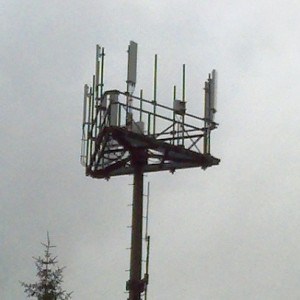 When Verizon Wireless finally fired up its network in Alaska in September of 2014, the writing was on the wall for at least one of Alaska’s homegrown wireless competitors.
When Verizon Wireless finally fired up its network in Alaska in September of 2014, the writing was on the wall for at least one of Alaska’s homegrown wireless competitors.
Faced with competing against Verizon’s $115 million, state-of-the-art advanced LTE network that already supports new features like Voice over LTE (far ahead of what many customers in the lower 48 states get) Alaska Communications System Group, Inc., decided it was time to sell.

An ACS and GCI-shared cell tower. (Photo: Rosemarie Alexander)
ACS’ 109,000 wireless customers won’t be going far. The buyer, General Communications, Inc., (GCI) is a co-investor in the Alaska Wireless Network that ACS also relies on to offer wireless service. Besides billing and rate plans, most ACS customers won’t notice much of a change after the $300 million sale is complete during the first quarter of this year. GCI will end up with about 253,000 customers after the transaction is finished, which represents about one-third of the Alaskan wireless marketplace. The sale will mean most Alaskans will have a practical choice of three major wireless carriers — AT&T, Verizon Wireless, and GCI.
ACS, weighed down by debt, wanted out of the wireless business because it has proven expensive to support a network serving a high-cost, low margin state like Alaska, where small communities are often far apart. Serving cities like Fairbanks and Juneau is one thing. Serving hundreds of settlements like Meyers Chuck (pop. 21) or towns like Unalakleet (pop. 688) is another.
Like many traditional rural or independent telephone companies, ACS sees gold in its future focusing on selling lucrative broadband service to residential and business customers, where profit margins often exceed 50 percent. There is plenty of room to grow if ACS invests in network upgrades. ACS currently only has a 20 percent share of Alaska’s broadband market, primarily selling DSL service. GCI, which sells cable broadband, has managed a speed advantage.
Both companies have reassured Wall Street that despite ACS’ renewed focus on broadband, there will be no fierce competition, no price wars, or lower prices for consumers. ACS will devote considerable resources into bolstering its business broadband marketing and has already secured contracts with the state government and a regional health consortium.
Despite the $300 million windfall, ACS plans to turn most of that money towards paying off its debts and possibly reinstating a dividend payout program for shareholders. The company is expected to only spend $35 million to $40 million annually on capital investment projects and executives promise they will only open their wallet for projects that guarantee a high return on that investment. As a result, ACS will likely not spend much on rural broadband expansion.


 Subscribe
Subscribe
Great! Now we just need MTA to be abolished and Alaska will have good internet at last!